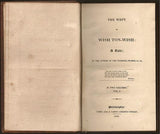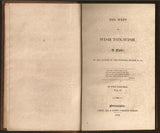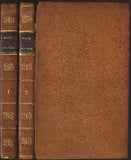The Wept of Wish Ton-Wish: A tale
Author: Cooper, James Fenimore (1789-1851)
Year: 1829
Publisher: Carey, Lea & Carey
Place: Philadelphia
Description:
2 volumes. i-[x]-251 pages; 234+[6 ad] pages. Small octavo (7 1/4" x 4 1/2") bound in full leather with black label to spine in gilt lettering. (BAL: 3844) First American edition. Published in London first in the same year.
Cooper was one of the most popular 19th-century American authors, and his work was admired greatly throughout the world. While on his death bed, the Austrian composer Franz Schubert wanted most to read more of Cooper's novels. Honoré de Balzac, the French novelist and playwright, admired him greatly. Henry David Thoreau, while attending Harvard, incorporated some of Cooper's style in his own work. Cooper was one of the first major American novelists to include African, African-American and Native American characters in his works. In particular, Native Americans play central roles in his Leatherstocking tales. However, his treatment of this group is complex and highlights the tenuous relationship between frontier settlers and American Indians as exemplified in , depicting a captured white girl who is taken care of by an Indian chief and who after several years is eventually returned to her parents. Often, he gives contrasting views of Native characters to emphasize their potential for good, or conversely, their proclivity for mayhem. Last of the Mohicans includes both the character of Magua, who is devoid of almost any redeeming qualities, as well as Chingachgook, the last chief of the Mohicans, is portrayed as noble, courageous, and heroic.
Condition:
Spine head chipped, exterior hinges beginning, old armorial book plates to front pastedowns else a very good set.
, depicting a captured white girl who is taken care of by an Indian chief and who after several years is eventually returned to her parents. Often, he gives contrasting views of Native characters to emphasize their potential for good, or conversely, their proclivity for mayhem. Last of the Mohicans includes both the character of Magua, who is devoid of almost any redeeming qualities, as well as Chingachgook, the last chief of the Mohicans, is portrayed as noble, courageous, and heroic.
Condition:
Spine head chipped, exterior hinges beginning, old armorial book plates to front pastedowns else a very good set.
Year: 1829
Publisher: Carey, Lea & Carey
Place: Philadelphia
Description:
2 volumes. i-[x]-251 pages; 234+[6 ad] pages. Small octavo (7 1/4" x 4 1/2") bound in full leather with black label to spine in gilt lettering. (BAL: 3844) First American edition. Published in London first in the same year.
Cooper was one of the most popular 19th-century American authors, and his work was admired greatly throughout the world. While on his death bed, the Austrian composer Franz Schubert wanted most to read more of Cooper's novels. Honoré de Balzac, the French novelist and playwright, admired him greatly. Henry David Thoreau, while attending Harvard, incorporated some of Cooper's style in his own work. Cooper was one of the first major American novelists to include African, African-American and Native American characters in his works. In particular, Native Americans play central roles in his Leatherstocking tales. However, his treatment of this group is complex and highlights the tenuous relationship between frontier settlers and American Indians as exemplified in , depicting a captured white girl who is taken care of by an Indian chief and who after several years is eventually returned to her parents. Often, he gives contrasting views of Native characters to emphasize their potential for good, or conversely, their proclivity for mayhem. Last of the Mohicans includes both the character of Magua, who is devoid of almost any redeeming qualities, as well as Chingachgook, the last chief of the Mohicans, is portrayed as noble, courageous, and heroic.
Condition:
Spine head chipped, exterior hinges beginning, old armorial book plates to front pastedowns else a very good set.
Condition:
Spine head chipped, exterior hinges beginning, old armorial book plates to front pastedowns else a very good set.











